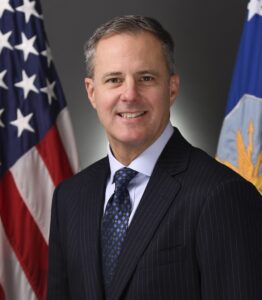In a historic first for the Air Force Medical Service, the Air Force Surgeon General selected Stephen M. Mounts as the U.S. Air Force deputy surgeon general on Nov. 1, 2024. Mounts is the first civilian to assume the role in the organization’s 75-year history.
“We’re fortunate to have someone with his level of experience to take this responsibility,” said Lt. Gen. John DeGoes, U.S. Air Force Surgeon General. “Civilian Airmen play a significant role in the success of the Air Force Medical Service mission. He has 32 years of experience in the AFMS as both an active-duty medical officer and as a senior civilian in a leadership role.”
Mounts joined the AFMS in December 2022 as the associate deputy surgeon general and onboarded as the organization’s first senior executive service civilian. As the ADSG, he reported directly to the surgeon general to execute AFMS initiatives while supporting the Secretary of the Air Force, Air Force Chief of Staff, and Space Force Chief of Operations.
In addition to becoming deputy surgeon general, he will retain his position as chief of the Medical Civilian Corps. Mounts, who served for 30 years on active duty as a Medical Service Corps officer, said his combined experience as a uniformed officer and time as the ADSG will be an asset to the organization.
As the Department of Air Force continues to establish the Air Force Medical Command, AFMS planners are balancing leadership positions across the Headquarters Air Force Surgeon General and Headquarters AFMEDCOM organizations. With the HAF/SG’s focus on policy and the organization, training, and equipping mission, Mounts said leaders opted to modify the DSG role to establish a senior executive leadership position that could leverage personal experience and enhance continuity, especially in executing long-term plans.
“This opportunity could serve as a stabilizing force over time, given that Department of the Air Force planning and resourcing cycle occurs in five-year increments,” Mounts said. “Service members on active-duty tours don’t get to see those plans come to full fruition.”
Military leaders who served as the deputy surgeon general have remained in the position for approximately three years.
The AFMS will take advantage of Mounts’ experience in senior civilian leadership and his health administration background to help guide the senior leadership team as the Air Force Medical Service transforms.
Spearheading a change in tradition as the first civilian to take on the role, Mounts expressed his admiration for deputy surgeon generals who came before him. Only two other deputy surgeon generals have served with a non-physician background: Maj. Gen. Michael K. Wyrick, former chief of the Medical Service Corps; and Lt. Gen. Dorothy A. Hogg who served as chief of the Air Force Nurse Corps and later as the Air Force surgeon general.
“I have served with and admired several former deputy SGs over the years, many of whom moved on to serve as the surgeon general,” he said. “Names like Randolph, Roudebush, Travis, Hogg, Ediger, Murphy, and of course Lt. Gen. DeGoes as our most recent active-duty, two-star DSG. I am quite fortunate to follow in their footsteps, and excited about the opportunities it will bring to provide more continuity in the DSG role as we continue to make the AFMS and our Air and Space Forces better.”
Mounts said he’ll employ his career-long commitment to improving organizational climate and developing a sense of community as he helps guide the AFMS through the transition.
“The recent changes and uncertainty of our transition to the new organizational structure has made this even more important,” he said. “We will get through this as a team – military, civilian and contract staff alike. I will continue to focus on strengthening connections with Air Force and Space Force counterparts in the Pentagon as well as our friends in the joint staff, Office of the Assistant Secretary of Defense Health Affairs, Defense Health Agency, Veterans Affairs, and sister services. Time and again relationships matter, and these connections will sustain us through the challenges ahead.”

